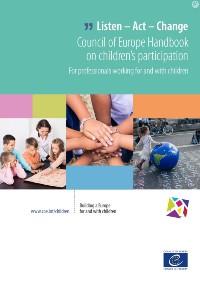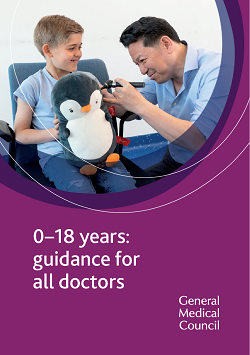Guide to children’s participation in decisions about their health
Helping children express their views

The ability of children to express their views and opinions can be influenced by many factors, including their age, capacities and maturity; whether they have or have not had any experience of participation either in healthcare or other relevant decision-making processes (at home, school or other); the extent to which they understand their situation; and how comfortable and engaged they feel within the decision-making process. Professionals should not assume children will share their thoughts voluntarily.
To support children in expressing their views, healthcare professionals should:
Build a trusting relationship to ensure mutual respect, both in the short- and long-term perspectives.
Children are more likely to express their views when they trust the person they are talking to. To the extent possible, healthcare professionals should get to know the child and their personal needs and characteristics; and always be honest. Children may need to be reassured that their opinions and thoughts are important, even “small” concerns that may not seem important to the health professional.
Consider children’s needs, including privacy and confidentiality issues that are important for children, but often neglected, and are particularly relevant for older children.
Privacy is an important issue when working with children, especially when sharing or discussing information concerning their own health. Even with younger children, it may be important, or even necessary, to allocate time alone with the child to provide space for them to discuss whatever matters to them. It is critical to discuss confidentiality issues with children, at the outset and allow them time to ask questions. Access to confidential medical counselling and advice without parental authorisation should be ensured, irrespective of the child’s age, where this is needed for the child’s safety or well-being, for instance in cases of suspected child abuse and maltreatment.
All healthcare professionals working with children must be trained, including on communication skills.
Training and practices should involve all team members and a continuum should be ensured, for example, with good communication between nurses, doctors or other professionals involved.
In some national contexts, health workers with a specific training, such as health play specialists or Child Life specialists, positively reinforce teams, supporting children and families by using age and developmentally appropriate methods to help them better understand and cope with healthcare situations and treatments, and by being a learning resource for other health professionals to develop similar skills.
The physical environment can also play an important role.
For example, ensuring that children can express their views in a private office or room or that there are no interruptions, such as a support or other professionals often coming into the office or room. For younger children, a more friendly environment can also help them to feel at ease (i.e. a room with toys, sitting down on the floor or other strategies).
Creating a trustful interaction with children entails, for example:
Make sure healthcare professionals introduce themselves by name and talk to the child using their name.
Support and invite the child to talk about to what extent they wish to participate, in what way and when.
Ask if the child prefers to talk with you in the presence of parents or alone.
Play while talking. This helps reduce the stress of discussing difficult topics and helps speaking more freely.
Practice both active questioning and active listening.
Check that the child understands the information given.
Ask the child what they think. This gives permission to express. Do not assume that a child will share thoughts voluntarily.
Encourage the child to ask questions and reply.
Avoid making judgements in all interactions.
Allow more time for the child to think, if they want and need it.
Respect a child’s silence while ensuring that the child has opportunities at later stages to express their views if they wish to do so.
Take into account the child’s biological rhythm, tiredness and length of appointments.
Listen – Act – Change - Council of Europe Handbook on children’s participation - For professionals working for and with children
This reference document provides very hands-on guidance and tips for professionals working with children on how to connect with children and establish a trustful relationship with them.
Connecting with children

Participation depends on both adults and children believing in each other and in the process. Children need to know that professionals are interested in their opinion and want to find a solution which takes their views into account. Where professionals involved in decision making are doctors, nurses, teachers, social workers, early years workers or managers who already know the child or children involved, children will use past experiences of those individuals as the basis for decisions about whether to trust them. For example, children who feel their teachers listen to and take seriously their idea during day-to-day classroom activities are more likely to talk to that teacher about serious concerns when they arise, such as bullying or sexual violence. Known professionals can build trusting connections with children through respecting their views.
Professionals should provide information about themselves, their role, the limits of confidentiality that will apply and the length of time they are likely to be involved in a child’s life. This can be done with the support of accessible information (e.g. leaflets or videos) prepared as described in the subsection above. But it is also important that this is provided to children in a personalised way. Sometimes known professionals will need to provide this kind of information because the decision-making process is new to the child. When the meeting is with a new person, and is not an emergency, children should be given information beforehand about what will happen. Where possible, professionals meeting children for the first time should be introduced by someone a child knows. For example, a parent or foster carer might introduce a new social worker to their child and stay with them until the child feels confident to meet with the social worker alone. Information is often best provided through a personalised conversation, so that children are encouraged to speak and feel listened to at the very start.
Even in the shortest encounter and in difficult circumstances, research evidence shows that effective communication can be established when professionals, such as immigration workers, share a little of themselves. With one question, about for example hobbies, doctors can create an atmosphere in which it is easier for a child to speak. One of the goals of this interaction is to ensure that children feel comfortable in stating or showing their preferences, and that they feel their wishes will be taken into account. Professionals should consider how they can build at least one moment of human connection into their first encounters with children.
The extent of time taken to build effective connections will depend on each child’s circumstances and on the skills of the professional. Investing the necessary time in this phase will help improve the quality of the process for everyone concerned. There may also be times throughout the participation processes where returning to this phase of building a connection and rapport becomes necessary. This is particularly likely in circumstances where a child has lost trust in adults who are meant to be responsible for them or their care. Professionals can promote sustained meaningful connections with children by being honest and available.
0-18 years - Guidance for doctors - General Medical Council - United Kingdom

This is an example of national guidelines and professional standards wich include practical advice on how to create effective communication between doctors and children.
14. Effective communication between doctors and children and young people is essential to the provision of good care. You should find out what children, young people and their parents want and need to know, what issues are important to them, and what opinions or fears they have about their health or treatment. In particular you should:
- involve children and young people in discussions about their care;
- be honest and open with them and their parents, while respecting confidentiality;
- listen to and respect their views about their health, and respond to their concerns and preferences;
- explain things using language or other forms of communication they can understand;
- consider how you and they use non-verbal communication, and the surroundings in which you meet them;
- give them opportunities to ask questions, and answer these honestly and to the best of your ability;
- do all you can to make open and truthful discussion possible, taking into account that this can be helped or hindered by the involvement of parents or other people;
- give them the same time and respect that you would give to adult patients.
15. You should make it clear that you are available to see children and young people on their own if that is what they want. You should avoid giving the impression (whether directly, through reception staff or in any other way) that they cannot access services without a parent. You should think carefully about the effect the presence of a chaperone5 can have. Their presence can deter young people from being frank and from asking for help.
16. You should take children and young people’s views seriously and not dismiss or appear to dismiss their concerns or contributions. Disabled children and young people can feel particularly disadvantaged in this respect.
17. Children and young people usually want or need to know about their illnesses and what is likely to happen to them in the future. You should provide information that is easy to understand and appropriate to their age and maturity about:
- their conditions
- the purpose of investigations and treatments you propose and what that involves, including pain, anaesthetics and stays in hospital
- the chances of success and the risks of different treatment options, including not having treatment
- who will be mainly responsible for and involved in their care
- their right to change their minds or to ask for a second opinion.
18. You should not overburden children and young people or their parents, but give them information at an appropriate time and pace, and check their understanding of key points.
19. You should talk directly and listen to children and young people who are able to take part in discussions about their care. Young people who are able to understand what is being said and who can speak for themselves resent being spoken about when they are present. But younger children might not be able to understand what their illness or proposed treatment is likely to involve, even when explained in straightforward terms.
20. You should only keep the type of information described in paragraph 17 from children or young people if:
- it would cause them serious harm (and not just upset them or make them more likely to want to refuse treatment)
- they ask you to, because they would prefer someone else to make decisions for them.
21. You have the same duty of confidentiality to children and young people as you have to adults. But parents often want and need information about their children’s care so that they can make decisions or provide care and support. Children and young people are usually happy for information to be shared with their parents. This sharing of information is often in the best interests of children and young people, particularly if their health would benefit from special care or ongoing treatment, such as a special diet or regular medication. Parents are usually the best judges of their children’s best interests and should make important decisions up until children are able to make their own decisions. You should share relevant information with parents in accordance with the law and the guidance in paragraphs 27, 28 and 42 to 55.
iSupport Case studies - Applying standards to real-life clinical scenarios
The team behind the iSupport Rights-based standards for children has developed four case studies (scenarios) that aim to demonstrate how the standards for child-centred healthcare can be applied in a range of clinical contexts and procedures. In each case, a clinical situation is given and explored, first without applying the standards and then, applying the rights-based standards. Whilst the first example within each case study results in a procedure being completed, this is often at the detriment of a child’s short and long-term well-being as their interests are not prioritised over those of the parent/carer, professional or institution.
Children's Hospital in Munich establishes ChildLife Specialist programme - Germany
In 2020, the Child Life Specialist flagship programme was implemented at the Dr von Hauner Children’s Hospital in Munich as the first Child Life Specialist programme in Germany, building up on US-based experiences.
To ensure that these children receive the best possible child-centred and holistic support, Child Life Specialists work alongside doctors and nurses to help address the specific needs of children in hospital
They help as comforters when sick children and their parents need them.
They help as caregivers who have time when the child needs them.
They help as contact persons for all questions concerning the daily routine and stay in the hospital.
They help as educators who teach children about illnesses and treatments.
They help as counselors who provide competent assistance to parents and families.
They help by giving time and attention.
They help by taking care of the rights of sick children.
Children's Hospital in Munich establishes ChildLife Specialist programme
Sant Joan de Déu Children’s Hospital, Barcelona - Spain

There is a dedicated webpage for children and families, where all this information is gathered (Para pacientes y familias | Hospital Sant Joan de Déu (sjdhospitalbarcelona.org).
SJD Barcelona Children's Hospital has also started using a new magnetic resonance device that help in reducing the duration of anaesthesia, which some patients need for these procedures, as well as an improved and safe experience for the patient and the family members who accompany them. The magnetic resonance facility has also been made more child-friendly, with themed decoration based on the planets, outer space and magnetic fields. This means that children will find a spaceship with an astronaut and information about gravity, the planets and the distance between objects and planet Earth, as well as the friendly dog Laika. This theme-based decoration has been used around the entire Diagnostic Imaging Area, creating a much brighter and more orderly ambiance.



